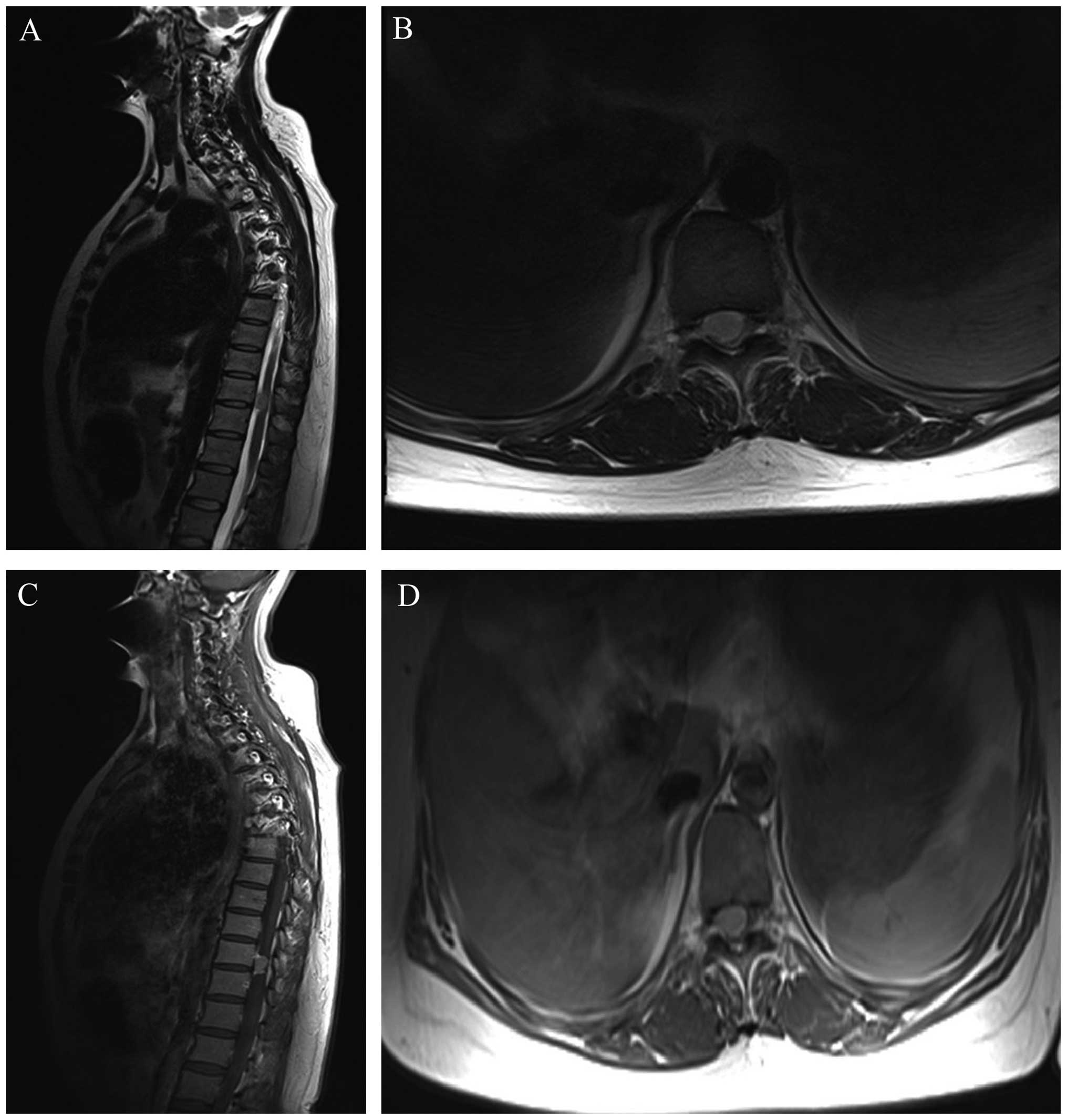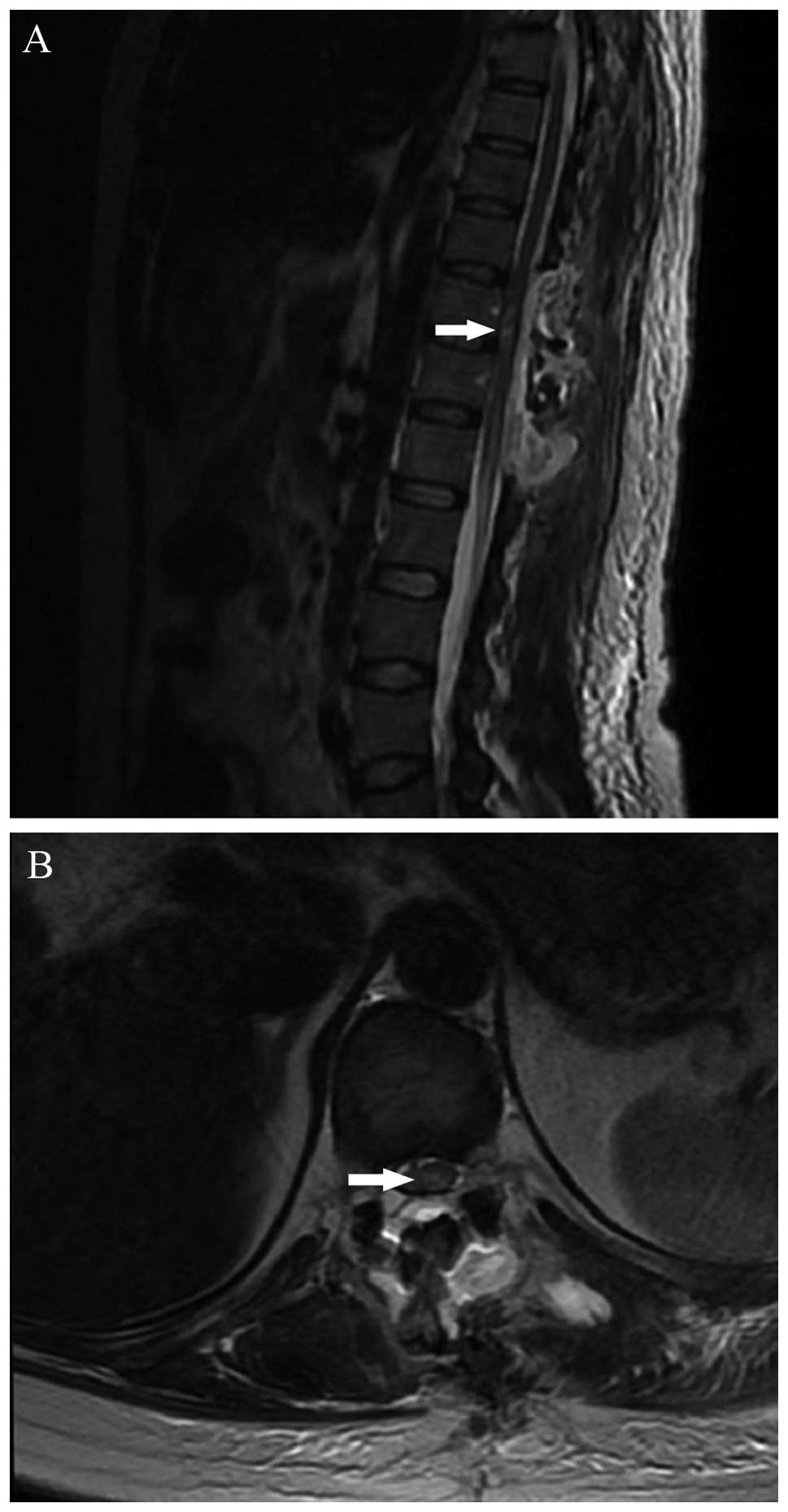|
1
|
Sandalcioglu IE, Hunold A, Müller O,
Bassiouni H, Stolke D and Asgari S: Spinal meningiomas: Critical
review of 131 surgically treated patients. Eur Spine J.
17:1035–1041. 2008. View Article : Google Scholar : PubMed/NCBI
|
|
2
|
Setzer M, Vatter H, Marquardt G, Seifert V
and Vrionis FD: Management of spinal meningiomas: Surgicalresults
and a review of the literature. Neurosurg Focus. 23:E142007.
View Article : Google Scholar : PubMed/NCBI
|
|
3
|
Ambekar S, Sharma M, Kukreja S and Nanda
A: Complications and outcomes of surgery for spinal meningioma: A
Nationwide Inpatient Sample analysis from 2003 to 2010. Clin Neurol
Neurosurg. 118:65–68. 2014. View Article : Google Scholar : PubMed/NCBI
|
|
4
|
Chin KR, Seale J and Cumming V: White cord
syndrome. of acute tetraplegia after anterior cervicaldecompression
and fusion for chronic spinal cord compression: a case report. Case
Rep Orthop. 2013:6979182013.
|
|
5
|
Lee KS, Shim JJ, Doh JW, Yoon SM, Bae HG
and Yun IG: Transient paraparesis after laminectomy in a patient
with multi-level ossification of the spinal ligament. J Korean Med
Sci. 19:624–626. 2004. View Article : Google Scholar : PubMed/NCBI
|
|
6
|
Orchowski J, Bridwell KH and Lenke LG:
Neurological deficit from a purely vascular etiology after
unilateral vessel ligation during anterior thoracolumbar fusion of
the spine. Spine. 30:406–410. 2005. View Article : Google Scholar : PubMed/NCBI
|
|
7
|
Taher F, Lebl DR, Cammisa FP, Pinter DW,
Sun DY and Girardi FP: Transient neurological deficit following
midthoracic decompression for severe stenosis: A series of three
cases. Eur Spine J. 22:2057–2061. 2013. View Article : Google Scholar : PubMed/NCBI
|
|
8
|
Uematsu Y, Tokuhashi Y and Matsuzaki H:
Radiculopathy after laminoplasty of the cervical spine. Spine.
23:2057–2062. 1998. View Article : Google Scholar : PubMed/NCBI
|
|
9
|
Aghakhani N, David P, Parker F, Lacroix C,
Benoudiba F and Tadie M: Intramedullary spinal ependymomas:
Analysis of a consecutive series of 82 adult cases with particular
attention to patients with no preoperative neurological deficit.
Neurosurgery. 62:1279–1285. discussion 1285-12862008. View Article : Google Scholar : PubMed/NCBI
|
|
10
|
McCormick PC, Torres R, Post KD and Stein
BM: Intramedullary ependymoma of the spinal cord. J Neurosurg.
72:523–532. 1990. View Article : Google Scholar : PubMed/NCBI
|
|
11
|
Ahn JS, Lee JK and Kim BK: Prognostic
factors that affect the surgical outcome of the laminoplasty in
cervical spondylotic myelopathy. Clin Orthop Surg. 2:98–104. 2010.
View Article : Google Scholar : PubMed/NCBI
|
|
12
|
Cramer DE, Maher PC, Pettigrew DB and
Kuntz C IV: Major neurologic deficit immediately after adult spinal
surgery: Incidence and etiology over 10 years at a single training
institution. J Spinal Disord Tech. 22:565–570. 2009. View Article : Google Scholar : PubMed/NCBI
|
|
13
|
Kou J, Fischgrund J, Biddinger A and
Herkowitz H: Risk factors for spinal epidural hematoma after spinal
surgery. Spine. 27:1670–1673. 2002. View Article : Google Scholar : PubMed/NCBI
|
|
14
|
Keegan JJ: The cause of dissociated motor
loss in the upper extremity with cervical spondylosis. J Neurosurg.
23:528–536. 1965. View Article : Google Scholar : PubMed/NCBI
|
|
15
|
Sakaura H, Hosono N, Mukai Y, Ishii T and
Yoshikawa H: C5 palsy after decompression surgery for cervical
myelopathy: Review of the literature. Spine. 28:2447–2451. 2003.
View Article : Google Scholar : PubMed/NCBI
|
|
16
|
Ginsburg HH, Shetter AG and Raudzens PA:
Postoperative paraplegia with preserved intraoperative
somatosensory evoked potentials. Case report. J Neurosurg.
63:296–300. 1985. View Article : Google Scholar : PubMed/NCBI
|
|
17
|
Tribus CB: Transient paraparesis: A
complication of the surgical management of Scheuermann's kyphosis
secondary to thoracic stenosis. Spine. 26:1086–1089. 2001.
View Article : Google Scholar : PubMed/NCBI
|
|
18
|
Young WF and Baron E: Acute neurologic
deterioration after surgical treatment for thoracic spinal
stenosis. J Clin Neurosci. 8:129–132. 2001. View Article : Google Scholar : PubMed/NCBI
|
|
19
|
Hasegawa K, Homma T and Chiba Y: Upper
extremity palsy following cervical decompression surgery results
from a transient spinal cord lesion. Spine. 32:E197–E202. 2007.
View Article : Google Scholar : PubMed/NCBI
|
|
20
|
Yamazaki M, Koda M, Okawa A and Aiba A:
Transient paraparesis after laminectomy for thoracic ossification
of the posterior longitudinal ligament and ossification of the
ligamentum flavum. Spinal Cord. 44:130–134. 2006. View Article : Google Scholar : PubMed/NCBI
|
|
21
|
Chiba K, Toyama Y, Matsumoto M, Maruiwa H,
Watanabe M and Hirabayashi K: Segmental motor paralysis after
expansive open-door laminoplasty. Spine. 27:2108–2115. 2002.
View Article : Google Scholar : PubMed/NCBI
|
|
22
|
Johnston CE II, Happel LT Jr, Norris R,
Burke SW, King AG and Roberts JM: Delayed paraplegia complicating
sublaminar segmental spinal instrumentation. J Bone Joint Surg Am.
68:556–563. 1986.PubMed/NCBI
|
|
23
|
Shan LQ, Ma S, Qiu XC, Zhou Y, Zhang Y,
Zheng LH, Ren PC, Wang YC, Fan QY and Ma BA: Hydroxysafflor Yellow
A protects spinal cords from ischemia/reperfusion injury in
rabbits. BMC Neurosci. 11:982010. View Article : Google Scholar : PubMed/NCBI
|
|
24
|
Wisselink W, Money SR, Crockett DE, Nguyen
JH, Becker MO, Farr GH and Hollier LH: Ischemia-reperfusion injury
of the spinal cord: Protective effect of the hydroxyl radical
scavenger dimethylthiourea. J Vasc Surg. 20:444–491. discussion
449-4501994. View Article : Google Scholar : PubMed/NCBI
|
|
25
|
Chan PH: Role of oxidants in ischemic
brain damage. Stroke. 27:1124–1129. 1996. View Article : Google Scholar : PubMed/NCBI
|
|
26
|
Seichi A, Takeshita K, Kawaguchi H,
Nakajima S, Akune T and Nakamura K: Postoperative expansion of
intramedullary high-intensity areas on T2-weighted magnetic
resonance imaging after cervical laminoplasty. Spine. 29:1478–1482.
discussion 14822004. View Article : Google Scholar : PubMed/NCBI
|
















